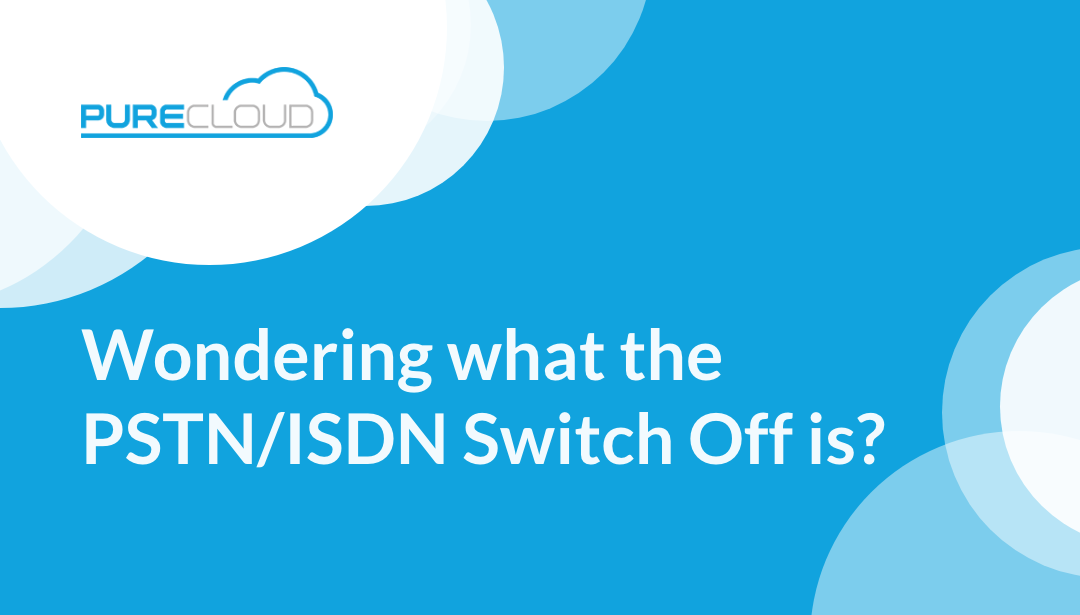What is the PSTN/ISDN Switch-Off
It feels like every technology provider in the UK is shouting the same line at the moment. “The switch-off is coming!”
This tends to come with a message hurrying you to upgrade your phone system now.
But not too many providers take the time to explain the facts and behind the headline. That’s what we want to clear up today. This is everything you need to know about the upcoming PSTN/ISDN switch-off.
Our message? Don’t panic! Yes, it does mean that some communications technology will become obsolete. But there’s time to plan alternatives strategically, without rushing. Before we get to that, let’s dig into the detail.

What is the PSTN / ISDN switch off?
The PSTN / ISDN switch-off is a process that was announced by BT Openreach way back in 2015. What are the PSTN and ISDN networks though?
PSTN, or the public switched telephone network, has been supporting the UK’s telecoms infrastructure for decades. It uses underground copper lines that enable communication between two points on a network. When you make a call, voice signals travel between these lines.
ISDN (short for Integrated Services Digital Network) was the step up from PSTN. It still uses copper lines, but digitises the network to allow businesses to use more lines at once, provide higher quality, more call control features and even video. ISDN was brought in widely during the 1990s. ISDN and PSTN are commonly referred to as landlines.
BT Openreach sees both of these services as 20th century tech that should be left in the past. Repair costs are high, and they’ve decided to upgrade our telecoms infrastructure.
In areas with fibre broadband rolled out, calls can now be made more reliably using the internet, using VoIP or SIP. The decision has been made to move all businesses over to internet-based calls and switch off landlines. 2 million businesses still use landlines though, and these will be affected.
Why is it happening now?
BT has seen that the tides are shifting towards internet-based business communications. Especially since the pandemic, we rely on internet-based call apps like Zoom and Teams more than ever before. We also use our mobiles much more, but there’s still a place for traditional desktop telecoms.
Landlines have started becoming more of a hindrance than a help. With broadband speeds getting ever faster thanks to the rollout of full fibre, landline call quality struggles to compete. Similarly, ISDN and PSTN lack the flexibility that modern businesses require. With new IP (internet) based services, you can take your handset with you to work from home, or just access your calls through a laptop or mobile. Landlines, however, are tied to a single location.
That’s why it makes sense to move away from the old network. It’s worth mentioning as well that this is underway in other countries. In Germany, Sweden, the Netherlands and Estonia, this process is already complete.
What’s affected by the switch-off?
Voice calls will all be routed over the internet. We’ve covered that. But it’s not just phones that rely on copper wires. If you have FTTC (fibre-to-the-cabinet) broadband, that also relies on PSTN wires to connect the cabinet to your site.
Also intercoms, CCTV, door entry systems and even fax machines can all run through ISDN or PSTN lines. It’s worth reviewing these systems to see whether you’re still relying on those legacy technologies.
What are the alternatives?
When businesses decide to make the switch away from ISDN or PSTN for calls, they essentially have two options.
The first is SIP. SIP, or session initiation protocol is a set of rules that allows you to create, modify and terminate calls over the internet. The main benefit of SIP is that businesses using landlines really don’t have to change much of their infrastructure. You can often keep your current phone system, and your provider can just set up the new lines.
The second and perhaps more interesting option is VoIP, or voice over internet protocol. This is a collection of technologies that allows voice communication to be transmitted via the internet in the same way that you’d send an email, using packets. Switching to VoIP does mean switching to a new phone system, but it offers you a great way to continually support your business.
VoIP allows you to easily expand your communications in line with your business growth. Unlike landlines, it’s incredibly simple to add new handsets and licenses to your network. VoIP also allows you to access better flexibility through integration with services like Microsoft Teams and Pure Cloud’s own UCA platform.
When do I need to start doing something?
This is the big question. Thankfully, BT gave businesses 10 years’ notice before switching their phones off. As we mentioned before though, 2 million businesses still use PSTN / ISDN. If you’re one of these businesses, or you don’t know what phone system you use, it’s important that you start looking into alternatives.
To make a long story short, there isn’t any need to panic, yet. Just make sure you know what needs to change, and put a plan in place of who you need to get in contact with to do so.
How can Pure Cloud help?
If you’re looking to make a change to your business communications, we can help you plan the next steps. We specialise in business technology services, from telecoms to connectivity and IT. We’ve got the expertise to help.
And at Pure Cloud, we offer a free, comprehensive business technology audit. You can find out more about what’s involved here. But in short, we are thorough, and for good reason. Service is everything to us. And in order to offer a great service, we understand the need to tailor what we offer to you – and to make it simple and easy to understand!
We’ll review what you have and make suggestions about where and how improvements can be made. This service can help you to prepare for the switch-off, by getting an action plan in place that benefits your business now and moving forward.
Get in touch to book your consultation. You can reach Pure Cloud at 0333 150 6780




Recent Comments